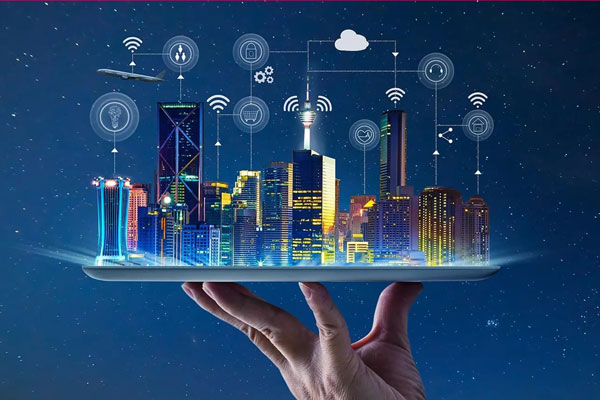
As the global population continues to grow and urbanization accelerates, cities must evolve to meet the demands of a changing world. By 2050, nearly 70% of the global population is expected to reside in urban centers, emphasizing the urgent need for smarter and more efficient cities. Smart infrastructure will play a pivotal role in this transformation, leveraging advanced technologies to create urban spaces that are not only efficient but also sustainable and livable. By adopting innovative solutions, cities can address key challenges and improve the quality of life for their residents.
What Makes a City Smart?
By definition, a smart city is not merely equipped with the latest devices or technology. Instead, its primary purpose revolves around using technology to solve real-world problems, making everyday life better for residents. One of the most fundamental elements of smart cities is the Internet of Things (IoT). This implies that smart cities use devices and sensors that can communicate with each other in real-time, sharing valuable data to improve services and operations. This network of connected devices can include everything from traffic lights and street lamps to waste bins and public transport systems, all working together to optimize city management.
Sustainability is another significant feature of smart cities. The challenges of climate change are increasing, and cities need to reduce their impact on the environment. At the heart of a smart city are services that are designed around the needs of its residents.

How Technology is Changing Urban Planning?
Urban planning has traditionally focused on building roads, zoning areas for development, and providing basic utilities. However, advancements in technology have significantly expanded the scope of this field. Modern cities are leveraging data-driven insights to make smarter, more informed decisions. Real-time analytics allow planners to identify patterns in traffic, energy consumption, and population density, enabling them to detect issues and implement faster, more effective solutions.
One groundbreaking innovation is the use of “digital twins”—virtual replicas of cities that enable planners to simulate various urban scenarios. These digital models help test new designs, policies, or infrastructure changes before implementing them in the physical world, minimizing risks and optimizing outcomes.
Moreover, artificial intelligence (AI) and machine learning are revolutionizing urban operations. AI can analyze traffic patterns and optimize traffic signals, easing congestion and improving mobility. Smart systems can monitor environmental changes and assess risks, ensuring cities stay ahead of challenges like pollution or natural disasters.
The applications of technology in urban design are virtually limitless. As cities continue to evolve, technological advancements will play an increasingly crucial role in shaping how people live, work, and interact within urban spaces.
Smart Infrastructure’s Impact on Sustainability
What smart infrastructure is capable of beyond mere convenience—changing life on an everyday scale in cities to be much easier. Smart infrastructure also impacts energy efficiency. IoT-enabled devices can equip buildings to consume lesser energy through automated adjustments of lighting, heating, and cooling according to usage patterns. This does not only lower utility costs for the residents but also reduces the city’s overall carbon footprint. Environmental monitoring systems, like air quality sensors, give immediate data to the residents so they can make proper decisions on whether to go out or take precautions for better health. This makes life in cities more comfortable and sustainable and benefits the environment as well as the people staying there.

Life in Cities and Overcoming Challenges
While the potential of smart infrastructure is clear, there are many challenges in its way to complete fruition. One of the biggest hurdles will be ensuring data privacy and security. As cities gather more data from sensors and devices, protecting the privacy of residents is a concern to ensure that sensitive information is not being compromised. Addressing such an issue will prove essential for maintaining public trust in the technology.
Another issue is the cost of smart infrastructure construction. The cost of implementing such systems is significant, and cities need to find ways to finance these innovations. At the same time, smart cities need to be inclusive. Not everyone has equal access to technology, so it’s important to ensure that smart infrastructure benefits all residents, not just the wealthy or tech-savvy. Cities must also be able to scale these solutions to fit different environments, from large metropolitan areas to smaller towns. Ensuring that smart infrastructure works across all types of cities is key to its long-term success.
Working Together for a Smarter Future
A smart city is built on collaboration, bringing together governments, businesses, technology providers, and residents to create a better, more connected urban future. Public-private partnerships are vital in driving innovation and funding smart infrastructure, but the active participation of citizens is equally important. By providing feedback, embracing new technologies, and engaging with city initiatives, residents help shape solutions that improve quality of life for all. The success of a smart city hinges on this collective effort, ensuring that technological advancements benefit the entire community and address shared challenges effectively.
About Author
Pankaj Sharma, Founder and Managing Director of K2 Infra, is an accomplished entrepreneur with over 14 years of experience in the telecom and infrastructure sectors. An Electronics Engineer and MBA in Marketing, he has worked with leading organizations like Aster Teleservices, ATC India, and VIOM Networks before launching his own ventures. His first venture, Ardom Telecom, earned recognition as the “Fastest Growing Technology Company of 2013” by Deloitte and was listed among the “Top 100 Great Places to Work in India” by Economic Times in 2014. Pankaj’s expertise spans strategic decision-making, project management, and business diversification.





